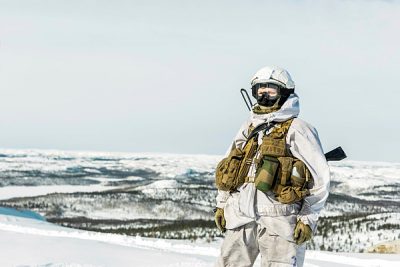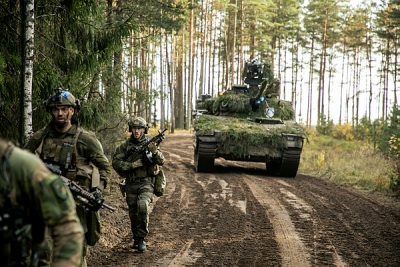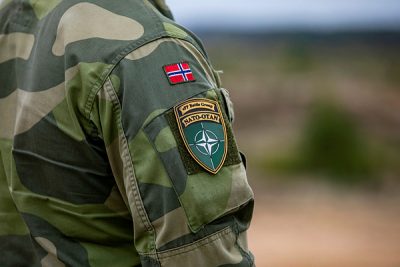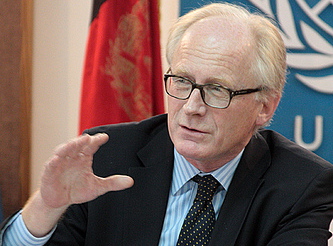Norway and Russia have long managed to remain “good neighbours” along their border in the far north, also in Arctic waters. Now, however, several foreign policy experts think Norway’s participation in what Russia perceives as threats to its security has played a significant role in current tensions.

“Moscow increasingly views the ‘Collective West’ as an offensive actor, and the High North (Arctic areas in Norwegian territory) as terrain for NATO expansion,” wrote the Norwegian Institute of International Affairs (NUPI) in a recent report. Norway therefore emerges as “an outpost” for NATO offensives, according to the institute’s researchers.
NUPI issued its ‘policy brief’ (external link) on the subject last month, after Russian President Vladimir Putin had sent thousands of troops to Russia’s border to Ukraine but before tensions reached a boiling point this month. NUPI noted that Norway “figures as an active partner” in years of “offensives” and perceived threats that motivated Putin, who in turn has been accused of creating a crisis that may lead to war.
The crisis is rooted in Russia’s efforts, which pre-date Putin’s own administration, to maintain a buffer zone around its borders to protect its own interests. Norwegian newspaper Klassekampen documented earlier this month how former Soviet and Russian leaders obtained at least oral promises 30 years ago from US, German and NATO officials that such a zone would be maintained, only to see such promises either broken or at least forgotten. That can explain why Putin seems to literally be on the war path now.
Gorbachev thought he had an agreement, Yeltsin, too
In February 1990, for example, less than three months after the Berlin Wall was literally torn down, former Soviet leader Mikhail Gorbachev told the US Secretary of State James Baker at the time that “any expansion of the NATO zone is unacceptable,” and Baker replied “I agree,” according to declassified records of the conversation that Klassekampen extracted from the US’ national security archive at George Washington University (GWU). Baker succeeded in getting Gorbachev to support the reunification of Germany in return for an agreement that NATO wouldn’t move “an inch east of its current position.”

NATO did, however, start moving east just as soon as former Soviet- and Warsaw Pact members were in a position to seek membership. That also seemed at odds with promises made, according to the GWU archive, by the former West Germany’s foreign minister at the time (Hans-Dietrich Genscher) and the former West German Chancellor Helmut Kohl. Both assured Gorbachev that German reunification would not “weaken Soviet security interests” and that NATO would not “expand its sphere of activity.” Klassekampen reported that archived records show similar promises were made by the leaders of Great Britain and France.
Gorbachev never received any written promises that would block NATO expansion, though, nor did Russia’s new president after Gorbachev, Boris Yeltsin. In January 1991, the now-ailing Soviet Union’s Red Army kept trying to maintain its sphere of influence, attacking demonstrators around the TV tower in the capital of Lithuania, which had become the first to declare itself independent of the USSR. Around 700 people were injured and 14 killed in the attack that stoked sympathy and support for Lithuania and other eastern bloc countries, many of which finally joined NATO in 2004. They followed Hungary, Poland and the Czech Republic, which joined in 1999.
‘No one’ remembered alleged assurances
Putin, meanwhile, was already gaining power in Russia and unhappy with the NATO expansion. Klassekampen reported how Putin reminded the world in 2007 that western powers like the US and Germany had issued assurances that that such wouldn’t happen after the Warsaw Pact was dissolved. “Where are these declarations today?” Putin said in a speech at the annual security conference in Munich. “No one even remembers them.” Yeltsin had already complained to former US President Bill Clinton in 1995 that he felt deliberately kept in the dark, telling Clinton that agreement to a NATO expansion on his part could equate to “treason against the Russian people” and even “humiliate” his country.

As Norway let the superpowers deal with the issue as usual, Gorbachev and Yeltsin may have stopped short of protesting NATO’s expansion any louder in a spirit of cooperation at the time. Thoughts were even aired that Russia itself might join NATO one day. Such feelings gradually eroded, after Russian leaders felt more and more overrun by the collapse of Yugoslavia and NATO’s bombing of Belgrade, along with military intervention in Iraq and the revolutions in Georgia and Ukraine. Putin clearly has grown more and more frustrated, not least as his personal popularity within Russia is now waning. That’s playing out through his authoritarian rule and crackdowns on the opposition, freedom of expression and, not least, the press.
Norwegian officials from top politicians to professors have repeatedly stressed in recent weeks how the Soviet Union in fact fell apart 30 years ago, newly independent nations emerged from the rubble, and they all had and have a right to decide for themselves over their own security. They had the right to seek membership in NATO and were welcomed into the fold. Moscow no longer has the right to make decisions for them, even though Putin’s current security demands suggest Moscow thinks it still does.
Norway provoking Russia, too
Norway, meanwhile, has suddenly found itself caught between wanting to remain good neighbours with Russia while also being a loyal NATO ally. As Norwegian Prime Minister Jonas Gahr Støre told foreign correspondents in Oslo earlier this month, his government wants to maintain “low tension in the High North.”
At the same time, however, both Norway and Russia have been caught spying on one another, with the arrest of Frode Berg in Moscow setting off a major scandal in Norway. Norway has also provoked Putin though its ongoing participation in NATO forces in Lithuania and in large NATO exercises that Russian officials think are too close to its border.

Norway has also allowed expanded US military presence on its own soil for the past several years. What began as allegedly “rotating” US troops sent to Norway for winter training has evolved into what many view as permanent and controversial presence on Norwegian military bases. The US has won influence over placement of aircraft and especially Norway’s new F35 fighter jets, several of which have been moved from Bodø to a new facility at Evenes near Narvik. The US has also controversially won permission to use a pier near Tromsø for its nuclear submarines, over the loud protests and regular demonstrations at the site by local residents who don’t want nuclear weapons in their backyard.
Russian officials have complained over all of this, not least over Norway’s recent moves to boost its own defense forces in Northern Norway. Even Norwegian military officials have admitted that the build-up at Evenes, which replaced Bodø this month as launch base for the F35s, is much greater than even NATO chief Jens Stoltenberg envisioned in 2012, when he was still Norway’s prime minister and Parliament approved the project. As relations hit the freezing point between Russia and the west, NATO expects Norway to better accommodate allied forces with Evenes as the new “gateway to Norway.”
‘Illusion’ that only Russia wants a buffer zone
Norwegian foreign policy experts, including veteran diplomat Kai Eide, also point to Norway’s participation in what’s prompted Putin to draw his proverbial red line. Eide, a former Norwegian ambassador to NATO, stressed in a commentary published in Norwegian newspaper VG that it’s “an illusion” to think Putin is alone in seeking a sphere of influence around its borders.

NATO and not least the US, which arguably controls the defense alliance of which Norway is a founding member, have long sought their own “sphere of interests” themselves, contends Eide. That’s where Norway is playing a major role, much to the dislike of both the Russians and some of Norway’s far-left parties like the Reds and Socialist Left. They’ve long opposed NATO membership.
Eide, meanwhile, is among several top Norwegian diplomats stressing the importance of taking Putin and the Russians seriously, if the West hopes to ease tensions and find a solution to the current conflict. Putin himself complained for 14 years before sending his troops to threaten Ukraine and try to keep the country inside his buffer. Eide all but scoffed at Stoltenberg’s claim in December that the time for the superpowers’ spheres of influence is over. Eide points out that all the superpowers still want such spheres of influence, not least the Americans.
Putin and his colleagues in Moscow can be viewed as simply reacting to what they view as a long string of broken, or at least forgotten, promises made by the West over three decades. Former Norwegian Prime Minister Kjell Magne Bondevik, long keen on participating in peace-keeping efforts, agrees with Eide that NATO, American and Norwegian leaders need to understand Russia’s concerns.
“These are difficult issues coming up now, and I think the West needs to show some wisdom and moderation and understand Russia, even though we think Russia’s fears are exaggerated,” Bondevik told Klassekampen. He stressed that all sovereign nations must be allowed to decide their own futures and that Russia isn’t entitled to any veto, despite its demands that no new members be admitted to NATO. “At the same time I can see that Russia has security concerns that weren’t always listened to during the promising years right after the Cold War,” Bondevik said, adding that the West “can have overlooked long-term effects that we’re seeing now.”
Norwegian Prime Minister Støre emphasized a need for empathy in his New Year’s address, which he and NATO allies may be well-served to apply in dealings with Russia. Støre, a former Norwegian foreign minister with lots of experience and success in working with Russia, has urged ongoing dialog even after it was inclusive last week. Støre’s own foreign minister, Anniken Huitfeldt who’s leading the UN Security Council this week, kept urging a “diplomatic solution” with Russia.
Meanwhile, tensions keep rising, as Russia sent landing ships into the Baltic, is suspected be being behind drones flying over Stockholm and Sweden responding by sending troops to Gotland. Denmark also responded by sending a frigate and fighter jets of its own into the Baltic, as another US nuclear submarine surfaced for replenishment in Tromsø. US Secretary of State Anthony Blinken was in Kiev on Wednesday for meetings with Ukraine’s president just after a White House spokesperson said Russia could invade Ukraine “at any time.”
After the series of inconclusive talks last week, Norwegian Defense Minister Odd Roger Enoksen of the Center Party stated that Ukraine, the rest of Europe and Norway are in “a serious situation” but put the responsibility on Russia to “de-escalate.” Norway will maintain its troops in Lithuania and move forward, Enoksen said, with this year’s Cold Response 2022 military exercises in the north.
newsinenglish.no/Nina Berglund

